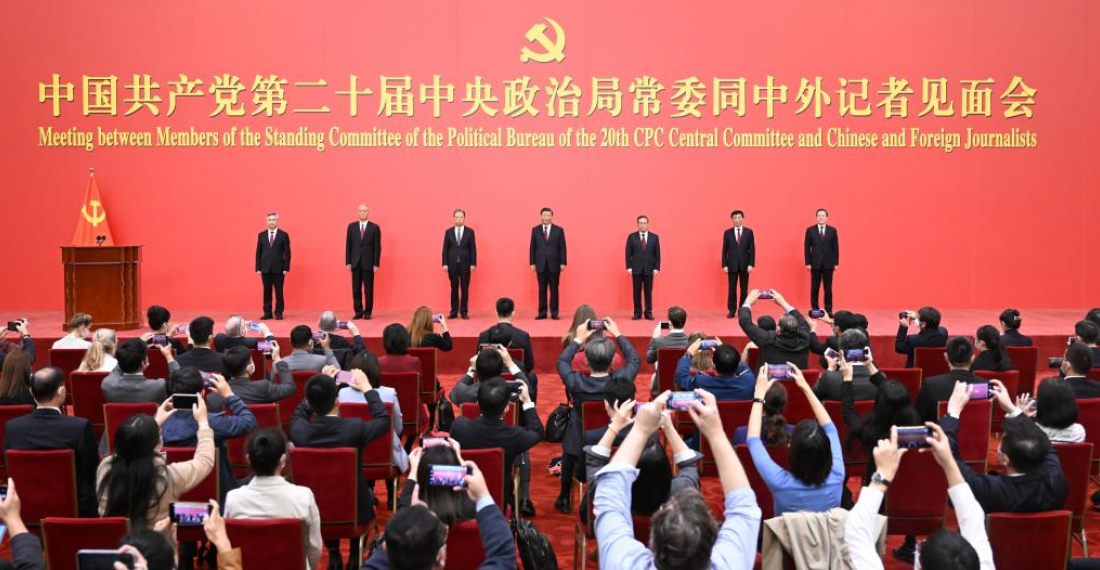It happened as was planned and expected. On Sunday (23 Ocotber) China's President Xi Jinping, was named to another term as head of the ruling Communist Party in a break with tradition that sees him becoming the paramount leader of China.
In the process Xi also promoted allies who support his vision of tighter control over society and the struggling economy.
Xi, who took power in 2012 was awarded a third five-year term as general secretary, discarding a custom under which his predecessor left after 10 years. The 69-year-old leader is expected by some to try to stay in power for life.
The apex of power in China is the seven member standing committee of the Politburo of the Communist Party. Xi and the other six men who form Standing Committee, appeared for the first time as a group before reporters in the Great Hall of the People, in central Beijing. The lineup appeared to reflect what some commentators called “Maximum Xi,” valuing loyalty over ability. Some new leaders lack national-level experience as vice premier or Cabinet minister that typically is seen as a requirement for the post.
related content on commonspace.eu: Monday Commentary: Comrade Xi's Party
The second person in seniority appears to be Li Qiang, the Shanghai party secretary. He is likely to emerge as the new prime minister. Zhao Leji, already a member, was promoted to No. 3, likely to head the legislature. Those posts are to be assigned when the legislature meets next year.
Li Qiang’s promotion served as apparent confirmation, as it puts him in line to be premier with no background in national government. Li Qiang is seen as close to Xi after they worked together in Zhejiang province in the southeast in the early 2000s.
Other new Standing Committee members include Cai Qi, the Beijing party secretary, and Ding Xuexiang, a career party functionary who is regarded as Xi’s “alter ego” or chief of staff. Wang Huning, a former law school dean who is chief of ideology, stayed on the committee. The No. 7 member is Li Xi, the party secretary of Guangdong province in the southeast, the center of China’s export-oriented manufacturing industry.
The Central Committee has 11 women, or 5% of the total. Its 24-member Politburo, which has had only four female members since the 1990s, has none following the departure of Vice Premier Sun Chunlan.
Party plans call for creating a prosperous society by mid-century and restoring China to its historic role as a political, economic and cultural leader.
During the congress, Xi also called for faster military development, “self-reliance and strength” in technology and defense of China’s interests abroad, which raises the likelihood of further conflict.
Xi, in a report to the congress last week, called for “regulating the mechanism of wealth accumulation,” suggesting entrepreneurs might face still more political pressure, but gave no details.
Xi suspended retirement rules to keep Gen. Zhang Youxia, 72, on the Central Committee. That allows Zhang, a veteran of China’s 1979 war with Vietnam, to stay as Xi’s deputy chairman on the commission that controls the party’s military wing, the People’s Liberation Army.
The party elite agreed in the 1990s to limit the general secretary to two five-year terms in hopes of avoiding a repeat of power struggles in previous decades. That leader also becomes chairman of the military commission and takes the ceremonial title of president.
Xi is on track to become the first leader in a generation to pick his own successor but has yet to indicate possible candidates. Hu Jintao and his predecessor, Jiang Zemin, both were picked in the 1980s by then-supreme leader Deng Xiaoping.
Ahead of the congress, banners criticizing Xi and “zero COVID” were hung above a major Beijing thoroughfare in a rare protest. Photos of the event were deleted from social media. The popular WeChat messaging app shut down accounts that forwarded them.
Xi’s government also faces criticism over mass detentions and other abuses against mostly Muslim ethnic groups and the jailing of government critics.







